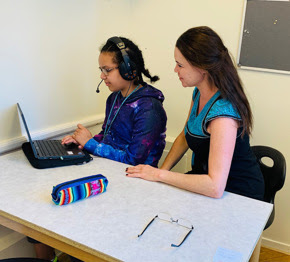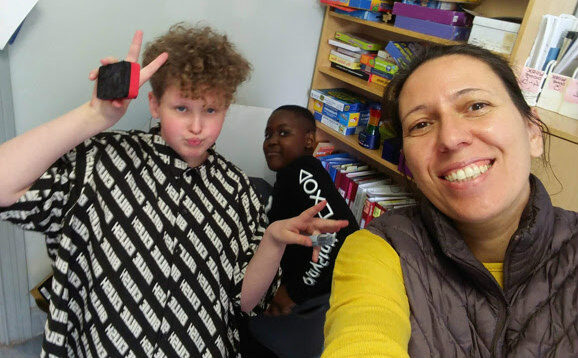Unlocking Student Potential
You might not know our Learning Support Team but you should! The LS Team is a crucial component of ensuring student success at SIS and their efforts allow all of our students to thrive.
There is as much diversity with learning styles and needs at our school as there is with countries of origin.
“Undiagnosed learning challenges can be difficult for students. Often they will feel certain aspects of school are challenging and they don’t understand why. Once we have identified a learning challenge it is so much easier to unlock a child’s potential,” explains Annette Nelwan, Case Manager for the Middle and Upper Schools.
Case Managers are responsible for designing and communicating interventions for students with learning disabilities and managing all aspects of the Individual Learning Plan (ILP) process. This can include conducting in-house psychometric testing, initiating external evaluations, analyzing and evaluating psychoeducational reports, liaising and coordinating with external specialists, communicating with parents and teachers, and writing the ILP documentation. The goal is to create individualized, strategic lessons and interventions for the student, consult with subject teachers on how they can help to implement the ILP, and identify strategies and accommodations to maximize the student’s learning.

“My own journey began as a classroom teacher but I always had a passion for personalized learning and teaching students with specific learning challenges,” says Annette, who has a MA in Special Education Needs from Nottingham University and a certification in Psychometric Testing, and specializes in multisensory teaching techniques, brain-based learning, dyslexia & ADHD, and testing to determine whether a learning support student is eligible for access arrangements.
When asked about the toughest part of her job, Annette gives advice we can all relate to: “Honestly, I’d say juggling everything at once without dropping any balls. Some crazy days everything might come at once but the trick is to switch hats quickly, breathe, and smile!”
Michael Parry, who works with our Upper School students, explains that it’s not just SIS that is supporting the students, but also the International Baccalaureate Programme itself.
“There are various accommodations, such as extra time or a separate room, granted by the IB. We can trial these with students to qualify that it benefits his/her performance. This can be the difference between passing and failing the final exams.”
Michael has been an integral part of building the LS at SIS, coming to work here in 2007 when the LS staff was only three people and with just eight students in the program.
“The student numbers have grown significantly in the last 14 years with more testing facilities and awareness of different diagnoses. LS in schools is really still in its infancy. There is a long way to go.”
According to Irene Gamble, Learning Support Teacher, Educational Psychologist and Cognitive Therapist, the school has made progress towards the implementation of the “co-teaching” model.
“The school is moving from a paradigm of only ‘pull-out’ service to a multi-service one. Now our students have the option to be supported by our Learning Support Teachers both during the regular lessons and outside for modified lessons,“ she explains.
“In this model, homeroom and LS teachers are sharing the duties and the responsibility of the classroom, providing a highly differentiated environment in terms of instruction delivery, learning material, and assessment.”
Irene is focused on getting her students intrinsically motivated by their personal progress and success. “I try to help my students deconstruct fixed negative ideas such as ‘I am not a math person’. For some students, it takes more time to move from a fixed mindset to one of growth but it is a very important transformation to embrace.”
“Inclusive education is a dynamic, ever-evolving approach that requires reflection and continuous enhancement,” says Dean of Students, Gunjit Sethi, who leads the team of Case Managers, Counsellors, Nurses, Teacher and Resource Specialists.
Occasionally, it can happen that a student requires a greater level of assistance than is available at SIS. When this is the case, the Team may consult, along with the parents, a variety of external professionals, such as psychologists, speech pathologists, or physiotherapists, to determine the best course of action.
“The Learning Support Team works tirelessly to ensure that students with mild to moderate learning needs receive the best possible support that is available within the infrastructure of SIS,” says Gunjit, ”We are very proud of our team and the difference they make in the lives of our students.”









